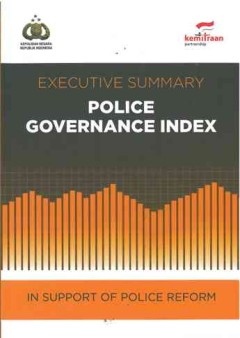Filter by

Executive Summary Police Governance Index 2015
- Edition
- -
- ISBN/ISSN
- 978-602-1616-50-5
- Collation
- viii, 70p.; 25 cm
- Series Title
- Seri: Indeks Tata Kelola Kepolisian
- Call Number
- 363.2 LOE e
- Edition
- -
- ISBN/ISSN
- 978-602-1616-50-5
- Collation
- viii, 70p.; 25 cm
- Series Title
- Seri: Indeks Tata Kelola Kepolisian
- Call Number
- 363.2 LOE e

Gubernatorial use of executive orders: unilateral action and policy adoption
I examine gubernatorial use of executive orders, and assess how executive action influences statute adoption. I argue that strong governors use executive orders to pursue policy objectives when they perceive legislation as unlikely to pass. Multilevel Event History Analysis of executive orders and the adoption of statutes that protect the lesbian, gay, bisexual and transgender (LGBT) community …
- Edition
- Volume 37, Issue 3, September 2017, p. 315-339
- ISBN/ISSN
- 0141814X
- Collation
- -
- Series Title
- Journal of Public Policy
- Call Number
- -

Multiple streams in member state implementation: politics, problem constructi…
This article applies the multiple streams approach to a multilevel implementation setting to analyse why Swiss member states enabled the labour market integration of asylum seekers between 2000 and 2003. It argues for integrating the social construction of target groups into the problem stream, and complementing the policy stream with inherited policy paths. A fuzzy-set qualitative comparative …
- Edition
- Volume 37, Issue 3, September 2017, p. 287-314
- ISBN/ISSN
- 0141814X
- Collation
- -
- Series Title
- -
- Call Number
- -

Regulatory capture and quality
Drawing on accounts of regulatory capture in which an industry�s influence activities pull regulation in its direction, apart from incentives or information, this article develops a formal model of capture as a shift in a policy-making agent�s preferences, due to costly actions by the industry. One type of action is rentseeking that produces only capture, whereas the other type also improves re…
- Edition
- Volume 37, Issue 3, September 2017, p. 261-286
- ISBN/ISSN
- 0141814X
- Collation
- -
- Series Title
- -
- Call Number
- -

Participation, process and policy: the informational value of politicised jud…
We develop a model of �notice and comment� rulemaking, focussing on strategic issues facing agencies and interest groups in light of judicial review in this process. Specifically, we analyse the incentives for agencies and groups to produce and reveal information during rulemaking. We show that judicial review can produce informed policymaking, but that participatory rulemaking can bias agency …
- Edition
- Volume 37, Issue 3, September 2017, p. 233-260
- ISBN/ISSN
- 0141814X
- Collation
- -
- Series Title
- Journal of Public Policy
- Call Number
- -

Explaining varying lobbying styles across the Atlantic: an empirical test of …
There is consensus in the literature that policymaking in the United States (US) and Europe generates different lobbying styles. Two explanations for these differences have been developed so far. The first posits that distinct lobbying styles reflect different political cultures. The second attributes distinct lobbying styles to variation in the institutional context in which lobbyists operate.…
- Edition
- Volume 37, Issue 4, December 2017, p. 459-486
- ISBN/ISSN
- 0141814X
- Collation
- -
- Series Title
- Journal of Public Policy
- Call Number
- -

Adoption, reinvention and amendment of renewable portfolio standards in the A…
It has long been recognised that interstate diffusion of policy innovations is comprised of distinct decisions including adoption, reinvention and amendment. Interstate influences are an important driver of these diffusion processes, but studies to date have not investigated the degree to which external influences vary across these decisions. We theorise that geographical peers will have the la…
- Edition
- Volume 37, Issue 4, December 2017, p. 431-458
- ISBN/ISSN
- 0141814X
- Collation
- -
- Series Title
- Journal of Public Policy
- Call Number
- -

Contingent technocracy: bureaucratic independence in developing countries
This study investigates the effects of formal bureaucratic independence under varying democratic conditions. Conventional accounts predict that greater formal independence of technocratic agencies facilitates policy implementation, but those claims rest on observations of industrialised, high-income countries that are also established democracies. On the basis of research in developing countrie…
- Edition
- Volume 37, Issue 4, December 2017, p. 401-429
- ISBN/ISSN
- 0141814X
- Collation
- -
- Series Title
- Journal of Public POlicy
- Call Number
- -

State capture from below? The contradictory effects of decentralisation on pu…
This study analyses the contradictory effects of decentralisation on public spending. We distinguish three dimensions of decentralisation and analyse their joint and separate effects on public spending in the Swiss cantons over 20 years. We find that overall decentralisation has a strong, significant and negative effect on the size of the public sector, thus confirming the Leviathan hypothesis.…
- Edition
- Volume 37, Issue 4, December 2017, p. 363-400
- ISBN/ISSN
- 0141814X
- Collation
- -
- Series Title
- -
- Call Number
- -

No vacancy: holdover capacity and the continued staffing of major commissions
Although the United States (US) federal bureaucracy is plagued by high vacancy rates generally, quorum requirements and small board sizes make vacancies particularly problematic within major independent regulatory commissions. Not all vacancies, however, are created equal. By statute, some major boards allow members to continue serving beyond their original term in the absence of a confirmed re…
- Edition
- Volume 37, Issue 4, December 2017, p. 341-361
- ISBN/ISSN
- 0141814X
- Collation
- -
- Series Title
- Journal of Public Policy
- Call Number
- -

Lessons learned: how parents respond to school mandates and sanctions
Over the past three decades, a reform movement bent on improving schools and educational outcomes through standards-based accountability systems and market-like competitive pressures has dominated policy debates. Many have examined reform policies� effects on academic outcomes, but few have explored these policies� influence on citizens� political orientations. In this study, using data from an…
- Edition
- Volume 37, Issue 2, June 2017, p. 205-232
- ISBN/ISSN
- 0141814X
- Collation
- -
- Series Title
- Journal of Public Policy
- Call Number
- -

How to measure public demand for policies when there is no appropriate survey…
Explanatory models accounting for variation in policy choices by democratic governments usually include a demand (by the public) and a supply (by the government) component, whereas the latter component is usually better developed from a measurement viewpoint. The main reason is that public opinion surveys, the standard approach to measuring public demand, are expensive, difficult to implement s…
- Edition
- Volume 37, Issue 2, June 2017, p. 173-204
- ISBN/ISSN
- 0141814X
- Collation
- -
- Series Title
- Journal of Public Policy
- Call Number
- -

The fiscal benefits of repeated cooperation: coalitions and debt dynamics in …
Do coalition governments really suffer from short time horizons in fiscal policymaking, as posited by standard political-economy models? This article focusses on coalitions that have created high levels of familiarity through shared governing experiences in the past and that are likely to cooperate again in future governing coalitions. I argue that such coalitions have incentives to internalise…
- Edition
- Volume 37, Issue 2, June 2017, p. 143-172
- ISBN/ISSN
- 0141814X
- Collation
- -
- Series Title
- Journal of Public Policy
- Call Number
- -

Europeanisation beyond the European Union: tobacco advertisement restrictions…
This article forges a link between support for European integration and adoption of tobacco advertisement restrictions in Swiss cantons. Leaning on the policy diffusion literature, this article argues that the more voters support deeper European integration, the more likely cantonal governments are to restrict tobacco advertising. Policymakers use voters� support for more European integration a…
- Edition
- Volume 37, Issue 2, June 2017, p. 113-142
- ISBN/ISSN
- 0141814X
- Collation
- -
- Series Title
- Journal of PUblic Policy
- Call Number
- -

Job creation and firm-specific location incentives
Government economic development programmes provide opportunities for firms to leverage financial incentives for business expansion and relocation. This article examines the ability of these incentives to promote employment. Using establishment-level data from the state of Kansas as well as original firm-level survey data, I evaluate the effectiveness of financial incentives in creating jobs thr…
- Edition
- Volume 14, Number 1, March 2018, p. 85-112
- ISBN/ISSN
- 0141814X
- Collation
- -
- Series Title
- Journal of Public Policy
- Call Number
- -

Plan generosity in health insurance exchanges: what the Affordable Care Act c…
The landmark United States healthcare reform law � the Affordable Care Act � provides an opportunity to study the dynamics of implementation for complex, politically contentious policies. Matland�s Ambiguity-Conflict Model suggests that bottom-up models will dominate in such cases. I exploit variation across states in the implementation of online health insurance marketplaces to test whether th…
- Edition
- Volume 37, Issue 1, March 2017, p. 55-83
- ISBN/ISSN
- 0141814X
- Collation
- -
- Series Title
- Journal of Public Policy
- Call Number
- -

The politics of strategy: why government agencies conduct major strategic rev…
In recent years, United States (US) policymakers have instituted quadrennial strategy reviews in several major policy areas. In this article, I examine why policymakers have initiated these large strategic reviews, and why a particular model for them has diffused from the US Defense Department to other government agencies. I find that policymakers have initiated the reviews principally to spur …
- Edition
- Volume 37, Issue 1, March 2017, p. 27-54
- ISBN/ISSN
- 0141814X
- Collation
- -
- Series Title
- Journal of Public Policy
- Call Number
- -

Defending the status quo across venues and coalitions: evidence from Californ…
This study investigates the conditions under which pro-status quo groups increase their advocacy success during an entire policymaking process. It scrutinises whether pro-status quo defenders who are involved in multiple institutional venues and who join many coalitions of interest groups are able to achieve their policy preferences. A case study focussing on the regulation of stem cell researc…
- Edition
- Volume 37, Issue 1, March 2017, p. 1-26
- ISBN/ISSN
- 0141814X
- Collation
- -
- Series Title
- Journal of Public Policy
- Call Number
- -

Exploring Gender Differences in Support for Rightist Parties: The Role of Par…
This contribution to the Special Issue on Gender and Conservatism uses expert and election surveys to explore the extent to which the feminist or traditional gender ideology of parties of the right relates to their economic and liberal/authoritarian ideology. We show that although parties of the left generally espouse more feminist ideologies than parties of the right, there are a significant n…
- Edition
- Volume 14, Number 1, March 2018, p. 80-105
- ISBN/ISSN
- 1743923X
- Collation
- -
- Series Title
- Politics & Gender
- Call Number
- -

Is There a Conservative Feminism? An Empirical Account
The question of conservative feminism in the United States did not really arise before the 2008 elections; most politically active conservative women leaders did not refer to themselves as feminists. Sarah Palin's vice presidential bid, however, prompted a shift. On a number of well-publicized occasions, Palin called herself a feminist, generating considerable discussion over whether conservati…
- Edition
- Volume 14, Number 1, March 2018, p. 56-79
- ISBN/ISSN
- 1743923X
- Collation
- -
- Series Title
- Politics & Gender
- Call Number
- -
 Computer Science, Information & General Works
Computer Science, Information & General Works  Philosophy & Psychology
Philosophy & Psychology  Religion
Religion  Social Sciences
Social Sciences  Language
Language  Pure Science
Pure Science  Applied Sciences
Applied Sciences  Art & Recreation
Art & Recreation  Literature
Literature  History & Geography
History & Geography